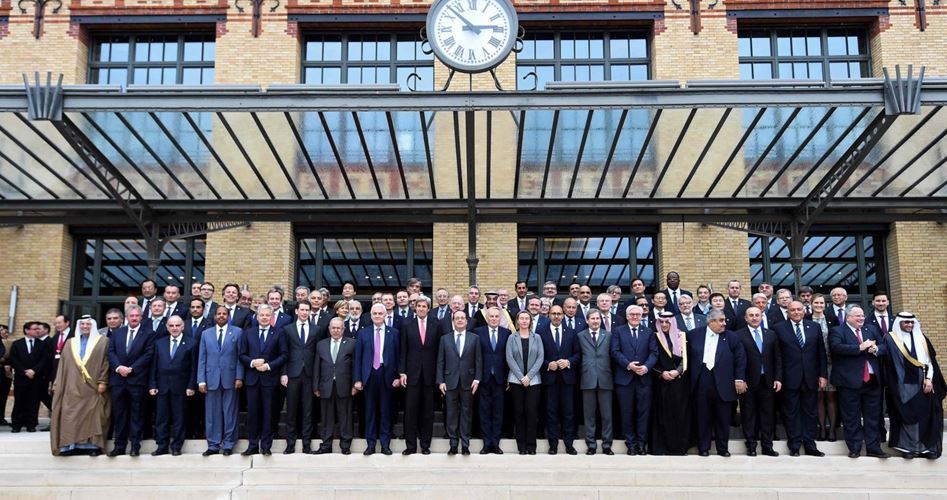www.aljazeerah.info
Opinion Editorials, January 2017
Archives
Mission & Name
Conflict Terminology
Editorials
Gaza Holocaust
Gulf War
Isdood
Islam
News
News Photos
Opinion Editorials
US Foreign Policy (Dr. El-Najjar's Articles)
www.aljazeerah.info
|
The Two-State Solution for the Israeli-Palestinian Conflict Is Still the Only Game in Town By Uri Avnery Al-Jazeerah, CCUN, January 20, 2017 |
 |
 |
|
| Participants in the Paris Peace Conference about the two-state solution for the Palestinian-Israeli conflict |
Confessions of a Megalomaniac
THE ARAB taxi
driver who brought me to Ramallah had no trouble with the Israeli border
posts. He just evaded them.
Saves a lot of trouble.
I was
invited by Mahmood Abbas, the President of the Palestinian National
Authority (as well as of the PLO and the Fat'h movement) to take part in
joint Palestinian-Israeli consultations in advance of the international
conference in Paris.
Since Binyamin Netanyahu has refused to take
part in the Paris event side by side with Mahmood Abbas, the Ramallah
meeting was to demonstrate that a large part of Israeli society does support
the French initiative.
SIMPLE AS it sounds, the Ramallah meeting was
not simple at all.
Before the death of Yasser Arafat in 2004, such
meetings were almost routine. Since our groundbreaking first meeting in
Beirut in 1982, during the Israeli blockade, Arafat met many Israelis.
Arafat had almost absolute moral authority, and even his home-grown rivals
accepted his judgment. Since, after our first meeting, he decided that
Israeli-Palestinian meetings served the cause of Palestinian-Israeli peace,
he encouraged many such events.
After his murder, the opposite trend
gained the upper hand. Palestinian extremists held that any meetings with
Israelis, whoever they might be, served "normalization" – a terrible,
terrible bogeyman.
Abbas has now put an end to this nonsense. Like
me, he believes that Palestinian statehood and independence can come about
only through a joint struggle of the peace forces on both sides, with the
help of international forces.
In this spirit, he invited us to
Ramallah, since Palestinians are not normally allowed into Israeli
territory.
He seated me next to him on the stage, and so the
meeting started.
MAHMOOD ABBAS – or "Abu Mazen"', as he is generally
known – was gracious enough to mention that he and I have been friends for
34 years since we first met in Tunis, soon after the PLO had left Beirut and
moved there.
Through a number of years, when my friends and I came
to Tunis, the same procedure was followed: first we met with Abu Mazen, who
was in charge of Israeli affairs, and drew up plans for joint action. Then
we all moved to Arafat's office. Arafat, who had an almost canny capacity
for making quick decisions, would decide within minutes "yes" or 'no".
There could hardly be two more different characters than Abu-Amar (Arafat)
and Abu-Mazen. Arafat was a "warm" type. He embraced and kissed his visitors
in the old Arab style – a kiss on each cheek for ordinary visitors, three
kisses for preferred ones. After five minutes, you felt as if you had known
him all your life.
Mahmood Abbas is a much more reserved person. He
embraces and kisses too, but it does not come quite as naturally as with
Arafat. He is more withdrawn. He looks more like a high-school principal.
I have a lot of respect for Mahmood Abbas. He needs tremendous courage
to do his job – the leader of a people under brutal military occupation,
compelled to cooperate with the occupation in some matters, endeavoring to
resist in others. The aim of his people is to endure and survive. He is good
at that.
When I complimented him on his courage, he laughed and said
that it was more courageous of me to enter Beirut during the siege of 1982.
Thanks.
The Israeli government succeeded, even before Netanyahu, in
splitting the Palestinians in the country into two. By the simple device of
refusing to honor their solemn pledge under Oslo to create four "safe
passages" between The West Bank and Gaza, they made a split almost
inevitable.
Now, while officially treating the moderate Abbas as a
friend and the extremist Hamas in Gaza as an enemy, our government behaves
exactly the other way. Hamas is tolerated, Abbas is considered an enemy.
That seems perverse but is really quite logical: Abbas can sway public
opinion throughout the world in favor of a Palestinian state, Hamas cannot.
AFTER THE Ramallah meeting, in a private session, I submitted to Abbas
a plan for consideration.
It is based on the appreciation that
Netanyahu will never agree to real peace negotiations, since these will lead
inevitably to the Two-State Solution, tut-tut-tut.
I propose to
convene a "Popular Peace Conference", which will meet, say, once a month
inside the country. In each session, the conference will deal with one of
the paragraphs of the future peace agreement, such as the final location of
the borders, the character of the borders (open?), Jerusalem, Gaza, water
resources, security arrangements, refugees, and so on.
An equal
number of experts and activists from each side will deliberate, put
everything on the table and thrash it all out. If agreement can be reached,
wonderful. If not, the proposals of both sides will be clearly defined and
the item left for later.
In the end, after, say, half a year, the
final "popular peace agreement" will be published, even with defined
disagreements, for the guidance of the peace movements on both sides.
Deliberations on the disagreements will continue until agreement is found.
Abbas listened attentively, as is his wont, and in the end I promised
to send him a written memorandum. I just did so, after consulting with some
of my colleagues, like Adam Keller, the Gush Shalom spokesman.
Mahmood Abbas is now preparing to attend the Paris conference, the official
aim of which is to mobilize the world for the Two-State Solution.
SOMETIMES I WONDER how I do not get infected with megalomania. (Some of my
friends believe that this cannot happen to me, since I already am a
megalomaniac.)
A few weeks after the end of the 1948 war, a tiny
group of young people in the new State of Israel met in Haifa to debate a
path to peace based on what is now called the Two-State solution. One was a
Jew (me), one a Muslim and one a Druze. I, just released from hospital, was
still wearing my army uniform.
The group was completely ignored by
everybody. No takers.
Some ten years later, when I was already a
member of the Knesset (as, by the way, were the other two), I went abroad to
see who could be convinced. I wandered around Washington DC, met with
important people in the White House, the State Department and the UN
delegations in New York. On the way home I was received in the Foreign
Offices in London, Paris and Berlin.
No takers, anywhere. A
Palestinian state? Nonsense. Israel must deal with Egypt, Jordan et al.
I made many dozens of speeches about this proposal in the Knesset. Some
powers started to take it up. The first was the Soviet Union, though rather
late, under Leonid Brezhnev (1969). Others followed.
Today there is
no one around who believes in anything but the Two-State Solution. Even
Netanyahu pretends to believe in it, if only the Palestinians would become
Jews or emigrate to Greenland.
Yes, I know that I didn't do it.
History did it. But I might be excused for feeling just a tiny little bit of
pride. Or a mini-megalomania.
THE TWO-STATE SOLUTION is neither good
nor bad. It is the only solution there is.
I know that there are a
number of good, even admirable people who believe in the so-called One-State
Solution. I would ask them to consider the details: what it would look like,
how it would actually function, the army, the police, the economy, the
parliament. Apartheid? Perpetual civil war?
No. Since 1948
everything has changed, but nothing has changed.
Sorry, the
Two-State Solution is still the only game in town.
Share the link of this article with your facebook friends
|
|
|
|
||
|
||||||


